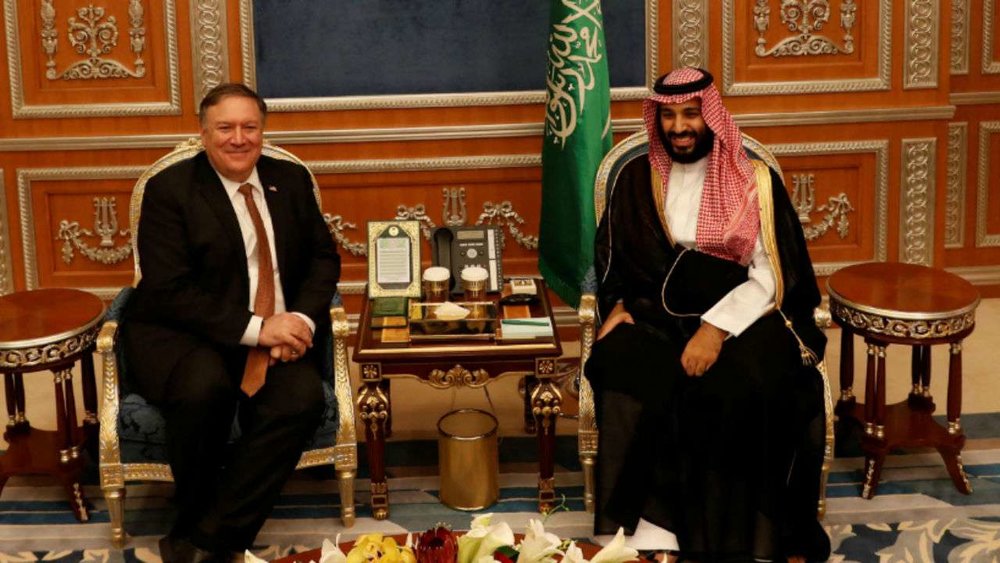MBS’s rampaging anger will not silence questions about Jamal Khashoggi

Inside his royal palace in Riyadh, Mohammed bin Salman is said to have alternated between dark brooding and rampaging anger in the days after the death of Jamal Khashoggi, as Saudi Arabia’s crown prince, or MBS, as he is widely known, looked for someone to blame for what Turkish officials have said was the journalist’s grisly murder.
One possible scapegoat, according to several sources, may be Maj. Gen. Ahmed al-Assiri, the deputy chief of Saudi intelligence. Assiri “has made numerous approaches to MBS on taking actions against Khashoggi and others,” said one source who is familiar with Western intelligence reports.
The U.S. government learned last month that Assiri was planning to create a “tiger team” to conduct covert special operations, I’m told, though officials didn’t know the targets. U.S. intelligence also learned, but only after Khashoggi’s disappearance after entering the Saudi Consulate in Istanbul on Oct. 2, that the crown prince had told his subordinates this summer that he wanted Khashoggi and other Saudi dissidents brought home.
The swirling reports and recriminations surfaced as Secretary of State Mike Pompeo visited the kingdom on Tuesday and urged King Salman and his son to conduct a “transparent” investigation of the disappearance of Khashoggi, a Post contributing columnist. But such efforts to seek a tidy solution will face rising skepticism in Congress, epitomized by the blast on Tuesday from Sen.?Lindsey O. Graham (R-S.C.) that “he [MBS] had this guy murdered.”
Jared Kushner, President Trump’s son-in-law and adviser, urged MBS last weekend to organize an investigation that could identify the culprit responsible for Khashoggi’s death, two sources told me. The next day, after speaking with the Saudi king, the president said he thought “rogue killers” within Saudi Arabia’s government may have been responsible, seemingly telegraphing a fall-guy strategy.
The emerging Saudi narrative appears to be that the palace authorized Khashoggi’s arrest and interrogation but not his murder. This version has some obvious holes: If the goal was “rendition” back to Saudi Arabia (as it is politely termed), then why interrogate him in Istanbul? And why did a forensics expert allegedly join the 15-man Saudi team photographed arriving at Istanbul airport? Finally, will such a Saudi account hold up under intense scrutiny by Congress, the media and, perhaps, U.S. courts?
The Khashoggi case isn’t the first time the palace allegedly attempted to kidnap a critic. After one prominent Saudi criticized aspects of the crown prince’s plan to privatize Saudi Aramco, the state-owned oil company, in a meeting abroad with potential foreign investors, a Saudi plane arrived along with an official who allegedly tried to arrest the man as a terrorist. He escaped and is now living outside the kingdom. But the message was clear: Challenging MBS was risky.
The darkening mood inside MBS’s palace in recent months shows a crown prince facing economic pressure and tightening his circle of advisers.
MBS’s key counselor is said to have been Saud al-Qahtani, the crown prince’s media adviser but also increasingly his consigliere in the kingdom’s battles with foreign adversaries such as Qatar and Iran as well as domestic critics. Like his boss, Qahtani is considered young and headstrong.
Qahtani organized interviews with MBS for visiting foreign journalists. But sources say he was quietly assuming a larger role overseeing strategy in social media, which the Saudis (like the Russians) view as a domain of war. Qahtani’s headquarters was a special “Center for Studies and Media Affairs,” operating inside the royal court without supervision from other ministries. It became, in part, a domestic snooping operation, sources say.
Qahtani is a demon in Saudi Twitter debates, with 1.3 million followers and barbed messages to dissenters. He has created a hashtag with the Arabic term for “Black List,” and he urges Saudis to report enemies of the kingdom. His opponents in Qatar refer to Qahtani’s followers (perhaps including automated bots) as an “Army of Flies.” U.S.?officials believe that, in addition to seeking dominance in social media, Qahtani and other advisers have helped MBS use the latest and most?aggressive hacking techniques against adversaries.
MBS’s tight inner circle has helped him push modernization efforts, such as reducing the power of the religious police, allowing women to drive and opening movie theaters and other public entertainment. But his team of palace advisers has often amplified, rather than challenged, the crown prince’s worst impulses.
This breakdown was evident immediately after Khashoggi’s disappearance, when official Saudi statements were all happy talk. Behind the scenes, says one knowledgeable source, “MBS went into a funk for several days after learning of Khashoggi’s death before re-emerging on a rampage of anger around what happened and trying to figure out a response.”
Adding to MBS’s anxiety in the weeks before Khashoggi’s disappearance was the erosion of his big plans to boost the Saudi economy. In August, the kingdom delayed indefinitely its push to privatize Saudi Aramco, which MBS had hoped would raise more than $100 billion. That same month, plans for a big investment in the automaker Tesla cratered. An investment deal with the Japanese company Softbank also hit a snag.
Surrounded by yes-men who saw suppressing dissent as part of a media war, and rattled by the reversal of his dreams for economic reform, MBS moved toward the fateful moment when Khashoggi entered the Saudi Consulate in Istanbul. When the brave journalist opened the door, he began a catastrophic process that has now put MBS’s own future in question. Putting a lid on a murder investigation won’t be easy, even for the brashly confident crown prince.
(Source: Washington Post)
Leave a Comment